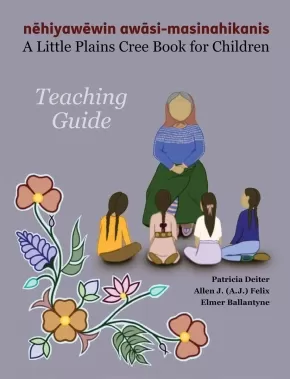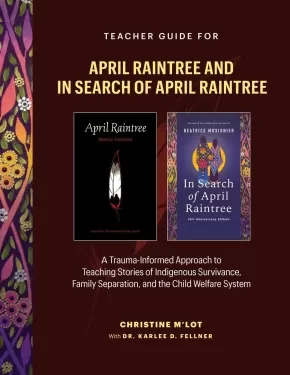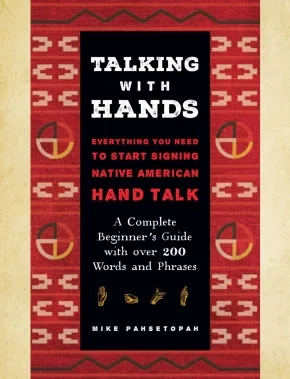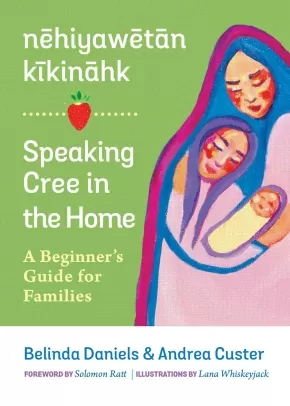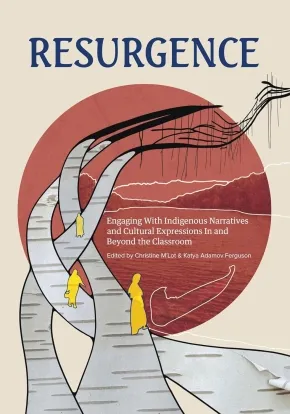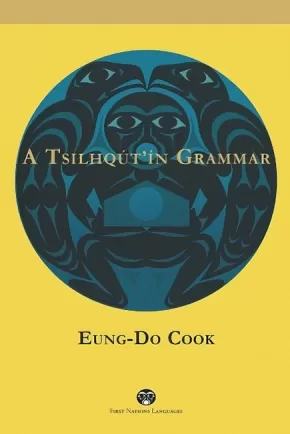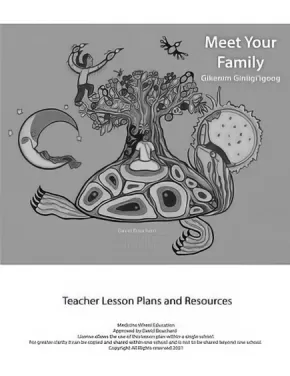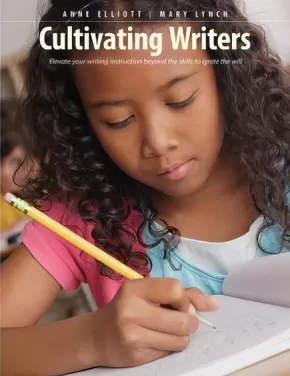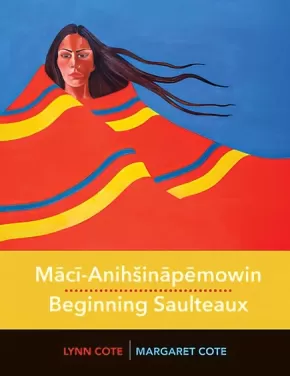
Language Resources
1
-
15
of
29 Results;
Sort By
Go To
of 2
FLASH SALE! Elements of Indigenous Style: A Guide for Writing By and About Indigenous Peoples - 2nd Edition
$20.97 $27.95
Editors:
Format:
Paperback
Text Content Territories:
Indigenous Canadian;
Reading Level: N/A
ISBN / Barcode: 9781550599459
Synopsis:
Synopsis:
The groundbreaking Indigenous style guide every writer needs.
The first published guide to common questions and issues of Indigenous style and process for those who work in words and other media is back in an updated new edition. This trusted resource offers crucial guidance to anyone who works in words or other media on how to work accurately, collaboratively, and ethically on projects involving Indigenous Peoples.
Editor Warren Cariou (Métis) and contributing editors Jordan Abel (Nisga’a), Lorena Fontaine (Cree-Anishinaabe), and Deanna Reder (Cree-Métis) continue the conversation started by the late Gregory Younging in his foundational first edition. This second conversation reflects changes in the publishing industry, Indigenous-led best practices, and society at large, including new chapters on author-editor relationships, identity and community affiliation, Two-Spirit and Indigiqueer identities, sensitivity reading, emerging issues in the digital world, and more.
This guide features:
- Twenty-two succinct style principles.
- Advice on culturally appropriate publishing practices, including how to collaborate with Indigenous Peoples, when and how to seek the advice of Elders, and how to respect Indigenous Oral Traditions and Traditional Knowledge.
- Terminology to use and to avoid.
- Advice on specific editing issues, such as biased language, capitalization, citation, accurately representing Indigenous languages, and quoting from historical sources and archives.
- Examples of projects that illustrate best practices.
Additional Information
208 pages | 5.50" x 7.50" | Paperback
Bridging the Reading Gap: Explicit instruction that supports spelling, phonics, morphology, and vocabulary development in grades 4-8
$32.95
Format:
Paperback
ISBN / Barcode: 9781551383675
Synopsis:
Synopsis:
A structured series of ready-to-use lessons that explore the “how” and the “why” of the English language with students. The engaging activities reflect the needs of all students, covering a wide range of abilities. Carefully curated word lists scaffold instruction for emergent to competent readers. The lessons are based on extensive classroom experience and include suggestions from teachers who have used the lessons in real classrooms. An ideal resource for using the spelling block to instruct, strengthen, and address gaps in phonics, morphology, and vocabulary knowledge for students in grades 4-8.
Educator Information
For use with students in grades 4 to 8.
Additional Information
160 pages | 8.37" x 10.87" | index, bibliography | Paperback
nēhiyawēwin awāsi-masinahikanis: A Little Plains Cree Book for Children—Teaching Guide
$74.95
Format:
Coil Bound
Text Content Territories:
Indigenous Canadian; First Nations; Cree (Nehiyawak); Plains Cree;
Reading Level: N/A
ISBN / Barcode: 9781778690273
Synopsis:
Synopsis:
A Little Plains Cree Book for Children—Teaching Guide contains lesson plans, student assignments, and other helpful information for teaching the Plains Cree language—a companion to nēhiyawēwin awāsimasinahikanis: A Little Plains Cree Book for Children: A Reference for Teaching the Plains Cree Language, the content of which focuses on terms familiar to the First Nations Cree people of Saskatchewan and follows curriculum for Kindergarten to Grade 12.
Educator Information
Find the companion resource here: A Little Plains Cree Book for Children: A Reference for Teaching the Plains Cree Language
A colouring book companion is here: A Little Plains Cree Colouring Book: Plains Cree People
Additional Information
128 pages | 8.50" x 11.00" | Spiral Bound
Teacher Guide for In Search of April Raintree and April Raintree: A Trauma-Informed Approach to Teaching Stories of Indigenous Survivance, Family Separation, and the Child Welfare System
$25.95
Format:
Coil Bound
Text Content Territories:
Indigenous Canadian; Métis;
ISBN / Barcode: 9781774920947
Synopsis:
Synopsis:
First published in 1983, In Search of April Raintree is a Canadian classic that presents a heart-rending and powerful account of the harsh realities that Indigenous and Métis peoples face.
Written by Anishinaabe educator Christine M’Lot with psychologist Dr. Karlee Fellner, the Teacher Guide for In Search of April Raintree and April Raintree helps teachers create dynamic learning experiences for their students in grades 11 and 12, while maintaining a respectful and dignified approach to Indigenous topics.
In this guide you will find:
- an inquiry based approach with resources for teaching from a trauma-informed stance
- easy-to-use lesson plans, reproducibles, and assessment opportunities
- a focus on wellness and supporting students while learning about difficult topics
- activities that encourage cross-curricular connections and collaboration
- free access to supplemental videos covering wellness topics
- a glossary of terms and suggested resources to extend learning
Educator Information
For use with students in grades 11 and 12.
This teacher guide can be used with either In Search of April Raintree or April Raintree, a version written specifically for teens in grades 9 to 12 that does not contain the graphic graphic scene in the original.
Additional Information
98 pages | 8.50" x 11.00" | Spiral Bound
Talking with Hands: Everything You Need to Start Signing Native American Hand Talk - A Complete Beginner's Guide with over 200 Words and Phrases
$32.99
Format:
Paperback
Text Content Territories:
Indigenous American; Native American;
Reading Level: N/A
ISBN / Barcode: 9781577153665
Synopsis:
Synopsis:
Explore Native American culture and learn Hand Talk, also known as Plains Indian Sign Language, Plains Sign Talk, and First Nation Sign Language.
In Talking with Hands, professional Native American dancer, storyteller, and educator Mike Pahsetopah reveals the beauty of Plains Indian Sign Language, which was once used as a common language between the Indigenous peoples of the region now generally known as the Great Plains of North America. The language was used for trade, but also for storytelling and by the Deaf community, making it a very common and useful tool in society. Today, only a few native speakers remain.
This beautifully designed book makes practicing Plains Indian Sign Language easy and engaging. Learn the proper positions and motions of this now-rare language with photos and descriptions throughout the pages. Follow along with diagrams to perfect your abilities.
Learn how to use your hands to convey the meanings of over 200 common words. In this detailed guide, you will learn to sign words like:
- Hungry
- Camp
- Evening
- Angry
- Fire
- Owl
- Together
- Brave
- And more
Honor and carry on the culture of the Plains peoples by learning the sign language they shared.
Additional Information
168 pages | 8.30" x 10.35" | 100+ color photos | Paperback
âhkami-nêhiyawêtân / Let’s Keep Speaking Cree
$32.95
Format:
Coil Bound
Text Content Territories:
Indigenous Canadian; First Nations; Cree (Nehiyawak);
ISBN / Barcode: 9780889778467
Synopsis:
Synopsis:
An important language resource that helps intermediate nêhiyawêtan learners begin to understand more advanced grammar of the language.
Let’s keep on speaking Cree:
In our language is our life;
Let’s keep on speaking Cree:
In our language is our identity.
Building on mâci-nêhiyawêwin / Beginning Cree, Solomon Ratt’s first influential Cree language resource, âhkami-nêhiyawêtân / Let’s Keep Speaking Cree helps intermediate nêhiyawêtan learners begin to understand more advanced grammar of the language. The textbook is more than a language textbook though: it includes a series of the author’s original stories written in Cree, complete with comprehension questions, making it ideal for self-study as well as classroom use.
Educator & Series Information
This book builds on mâci-nêhiyawêwin / Beginning Cree.
Latest Cree language workbook by highly respected author and educator Solomon Ratt, intended for intermediate readers/speakers/
learners
First title in the Continuing Language series, which will build upon our introductory Indigenous language learner texts
Includes sections on going to the doctor, Cree culture and values, protocols, faith, humility, teachings, and more.
Additional Information
304 pages | 8.50" x 11.00" | Spiral Bound
Animals Care for Mother Earth: A Teaching Resource for Personal Development
$16.95
Artists:
Format:
Paperback
Text Content Territories:
Indigenous Canadian; First Nations; Tsimshian (Ts'msysen);
ISBN / Barcode: 9781771745970
Synopsis:
Synopsis:
Animals Care for Mother Earth comprises six contemporary, interrelated stories and supporting resources for teachers. In the first story, animals cooperate to clean up a polluted pond. In subsequent stories, they care for each other in the aftermath of the pollution problem, demonstrating strength of character and social responsibility. This book can be used in elementary schools to teach—through storytelling—the value of personal strengths and community supports while incorporating Tsimshian language and knowledge into classroom lessons. It also provides many opportunities to extend the learning to other curriculum areas, including science, math, reading, writing, social studies, and art.
Reviews
"This teaching resource uses storytelling as a way to impart knowledge and initiate discussions and activities that support social and emotional learning.” – Canadian Teacher Magazine, Spring 2023 issue
Educator Information
Recommended for use with grades 1 to 6 (elementary students).
Everything educators need is included in this single work -- contemporary Indigenous stories to read aloud and explore with students, as well as story guides, a map, plant information pages, suggestions for classroom activities, discussion questions, inquiry activities, talking together points, information to support intergenerational or peer-to-peer learning, and connections to the Core Competencies and social and emotional learning (SEL) competencies.
Find a bundle for Animals Care for Mother Earth that includes the book and learning environment resources HERE!
Additional Information
32 Pages | 8.5" x 11" | ISBN: 9781771745970 | Paperback
nēhiyawētān kīkināhk / Speaking Cree in the Home
$19.95
Artists:
Format:
Paperback
Text Content Territories:
Indigenous Canadian; First Nations; Cree (Nehiyawak);
Reading Level: N/A
ISBN / Barcode: 9780889779006
Synopsis:
Synopsis:
A hands-on guide for parents and caregivers to develop best practices in revitalizing and teaching Cree to young children.
In nēhiyawētān kīkināhk / Speaking Cree in the Home, Belinda Daniels and Andrea Custer provide an introductory text to help families immerse themselves, their children, and their homes in nēhiyawēwin—the Cree language.
Despite the colonial attacks on Cree culture, language, and peoples, Custer and Daniels remind readers that the traditional ways of knowing and transferring knowledge to younger generations have not been lost and can be revived in the home, around the table, every day.
nēhiyawētān kīkināhk / Speaking Cree in the Home is an approachable, hands-on manual that helps to re-forge connections between identity, language, family, and community—by centering Indigenous knowledge and providing Cree learners and speakers with a practical guide to begin their own journey of reclaiming and revitalizing Cree in the home.
Readers are guided through methods for language learning, the basics of reading Cree and Standard Roman Orthography, pronunciation of vowels, engaging language-learning games, and examples of high-frequency words and phrases that can easily be incorporated into daily routines and taught to children young and old.
Reviews
“This is a welcome book for all who are interested in learning the Cree language, either for themselves alone or for themselves and their families. The book offers good guidance on the best practices in language learning based on the authors’ personal experiences in their respective language journeys.” —Solomon Ratt, author of mâci-nêhiyawêwin / Beginning Cree
“A major contribution, this book will be a useful resource in Cree classes, at both high school and university levels. But it is also useful for home use, as it describes the practical application of speaking Cree in the home and provides in an easy-to-read format and details a hands-on approach too.” —Dorothy Thunder (Plains Cree, Little Pine First Nation), Faculty of Native Studies, University of Alberta
“The activity-based learning lessons that are presented here should serve as a model not only for teaching the language in a family setting, but in any other formal and informal settings, because they cover all aspects of teaching and learning; the content, variety of methods, appropriate timing and setting. . . . The pioneering in Cree language acquisition and revival has begun and hopefully this book reaches all interested individuals.” —Ken Paupanekis, author of Pocket Cree: A Phrasebook for Nearly All Occasions
Additional Information
122 pages | 4.72" x 7.27" | Paperback
Resurgence: Engaging With Indigenous Narratives and Cultural Expressions In and Beyond the Classroom
$32.00
Editors:
Format:
Paperback
Text Content Territories:
Indigenous Canadian;
ISBN / Barcode: 9781774920008
Synopsis:
Synopsis:
A thoughtful guide to critical engagement with Indigenous literatures, perspectives, and teaching methods as well as ideas and action steps for bringing them into the classroom.
Resurgence is an inspiring collection of contemporary Indigenous poetry, art, and narratives that guides teachers in bridging existing K–12 curricula with Indigenous voices and pedagogies. Walk with us along the footbridge which seeks to:
- connect peoples and places
- link truth and reconciliation as ongoing processes
- symbolize the risk and urgency of this work for both Indigenous and settler educators
- engage tensions
- highlight the importance of balance, both of ideas and within ourselves
Through critical engagement with the texts, experienced educators Christine M’Lot and Katya Adamov Ferguson support readers in connecting with Indigenous narratives and perspectives, bringing Indigenous works in their classrooms, and creating more equitable and sustainable teaching practices.
In this resource, you will find
- diverse Indigenous voices, perspectives, and art forms from all across Turtle Island
- valuable concepts and methods that can be applied to the classroom and beyond
- practical action steps and resources for educators, parents, librarians, and administrators
Use this book as a springboard for your own learning journey or as a lively prompt for dialogue within your professional learning community.
Reviews
"Over the past several years, calls have come from across Canada for the inclusion of Indigenous worldviews and knowledge in all levels of education in the country. Enter...Resurgence." ––Windspeaker
Educator & Series Information
For use with K-12 curricula.
Contributors include KC Adams, Charlene Bearhead, Wilson Bearhead, Lisa Boivin, Nicola Campbell, Sara Florence Davidson, David A. Robertson, and Christina Lavalley Ruddy, and more!
Subjects / Themes: Education; Professional Development; Social Science; Indigenous Studies; Language Arts Disciplines; Study Teaching
This book is part of The Footbridge Series. This series aims to bridge curricular outcomes with Indigenous-centered content and perspectives from across Turtle Island. Like a footbridge, this series is intended to provide a path between Indigenous worldviews and the classroom, engaging differences, including tensions, and highlighting the importance of balance, all while helping teachers integrate Indigenous perspectives into multiple disciplines within the K-12 education system.
Table of Contents
Introduction
About This Book
About The Footbridge Series
Part 1: Resistance
Beyond Being Silenced by Sara Florence Davidson
- Connections
Poetry as Cultural Expression by Rita Bouvier
- Connections
T’seka Reflection by Lucy Hemphill
- Connections
Poetry by Louise Bernice Halfe
- Connections
Part 2: Resilience
Mental Health by David A. Robertson
- Connections
Writing as a Therapeutic Medium by Wanda John-Kehewin
- Connections
Birch Bark Technology by KC Adams
- Connections
Images and Health by Lisa Boivin
- Connections
Part 3: Restoring
Stories are Resurgence by Wilson Bearhead and Charlene Bearhead
- Connections
Why am I not on Star Trek? by Sonya Ballantyne
- Connections
Indigenous Spaces by Reanna Merasty
- Connections
Games as Resurgence by Elizabeth LaPensée
- Connections
Part 4: Reconnecting
Poems by Nicola I. Campbell
- Connections
Paths of Tradition by Russell Wallace
- Connections
Let the Children Play by Victoria McIntosh
- Connections
Ethnomathematics and Beading by Christina Ruddy
- Connections
The Contributors
Additional Resources
Index
Additional Information
224 pages | 7.00" x 10.00" | Paperback
Teacher Guide for the Sk'ad'a Stories Series: Intergenerational Learning and Storytelling in the Classroom
$23.95
Format:
Paperback
Text Content Territories:
Indigenous Canadian; First Nations; Haida;
ISBN / Barcode: 9781774920473
Synopsis:
Synopsis:
From the creators of Potlatch as Pedagogy: Learning Through Ceremony, the Sḵ'ad'a Stories series brings intergenerational learning to life. Haida children learn important life lessons from their Elders through real-life situations, cultural traditions, and experiences out on the land.
Written by Sḵ'ad'a Stories author Sara Florence Davidson and educator Katya Adamov Ferguson, the Teacher Guide for the Sḵ'ad'a Stories helps teachers engage their students through the lens of intergenerational learning and authentic experiences. This guide:
- outlines the Sḵ'ad'a principles found in the stories
- shows how to use the Sḵ'ad'a principles in your classroom
- provides the behind-the-scenes thinking of the authors and illustrator
- explains the significance of this series as part of Haida cultural resurgence and preservation
- provides critical perspectives on the impact of colonialism on Haida knowledges
- includes resources and inspirations for educators
This teacher guide is appropriate for all grade levels.
Educator Information
Table of Contents
Introduction
About the Sḵ’ad’a Stories Series
About This Guide
Part 1: Teacher Preparation: Understanding Cultural Contexts and the Emergence of Sḵ’ad’a
Haida Culture and Knowledges
- Haida Gwaii
- Silencing the Haida
- Thriving Haida Communities
Understanding Sḵ’ad’a
- Conversation With Sara
- Branch of Davidson Family Tree
Becoming “Story-Ready”
- Holistic Engagement with Stories
Part 2: Teacher Learning: Sḵ’ad’a for Educators
Significance of Series
Intergenerational Stories
Sḵ’ad’a for Educators and Professional Learning Communities
Sḵ’ad’a Principles
Part 3: Teacher Practice: Ideas for Engaging With the Sḵ’ad’a Stories
Sḵ’ad’a Principles in Practice
Themes and Connections
Engaging Sḵ’ad’a Stories With Students
- Interactive Read-Alouds
- Making Meaning From Stories
- Mentor Texts
- Critical Literacy
- Artifactual Literacies
Sampling of Sḵ’ad’a Activity Ideas
Book-Specific Supports—Jigging for Halibut With Tsinii
Book-Specific Supports—Learning to Carve Argillite
Book-Specific Supports—Returning to the Yakoun River
Book-Specific Supports—Dancing With Our Ancestors
Resources
References
Additional Information
48 pages | 8.50" x 11.00" | Paperback
A Tsilhqút’ín Grammar
$60.00
Format:
Paperback
Text Content Territories:
Indigenous Canadian; First Nations; Dene; Tsilhqot'in (Chilcotin);
ISBN / Barcode: 9780774865708
Synopsis:
Synopsis:
Tsilhqút’ín or Tsinlhqút’ín, also known as Chilcotin, is a northern Athabaskan language spoken by the people of the Chilco River (Tsilhqóx) in Interior British Columbia. This language is spoken by approximately 2,000 adults in six reserves, and both spoken and written forms are taught as part of school curricula. Until now, the literature on Tsilhqút’ín contained very little description of the language. With forty-seven consonants and six vowels plus tone, the phonological system is notoriously complex.
This book is the first comprehensive grammar of Tsilhqu´t’i´n. It covers all aspects of linguistic structure -- phonology, morphology, and syntax -- including negation and questions. Also included are three stories passed down by Tsilhqút’ín elders Helena Myers (translated by Maria Myers), William Myers, and Mabel Alphonse (translated by Bella Alphonse), which are annotated with linguistic analysis. The product of decades of work by linguist Eung-Do Cook, A Tsilhqút’ín Grammar makes an important contribution to the ongoing documentation of Athabaskan languages.
This book will be relevant to scholars of Tsilhqút’ín and of other Athabaskan languages, linguists in a range of topics (phonology, morphology, syntax, and semantics, as well as comparative and historical linguistics), and members of the Tsilhqút’ín First Nations.
Educator Information
Includes Indigenous contributions.
Table of Contents
Abbreviations and Symbols
Introduction
1 Sound System and Orthography
2 Words and Their Categories
3 Organization of the Verb
4 Theme Categories and Other Verb Classes
5 Simple Sentences
6 Complex Sentences
7 Movement and Other Syntactic Rules
8 Negation
9 Questions
10 Reference to Third Person and Morphosyntactic Problems
Appendix: Three Annotated Texts
References Cited
Additional Information
670 pages | 6.00" x 9.00" | Paperback
Authenticity Note: Because of the story contributions from Tsilhqút’ín elders, this book has received our Authentic Indigenous Text label. But, the author, linguist Eung-Do Cook, is not Indigenous. It is up to readers to determine if this will work as an authentic resource for their purposes.
Meet Your Family Teacher Lesson Plan
$7.99
Artists:
Format:
Paperback
Text Content Territories:
Indigenous Canadian; First Nations; Anishinaabeg; Ojibway;
ISBN / Barcode: 9781989122679
Synopsis:
Synopsis:
This is the Teacher Lesson Plan that accompanies the book Meet Your Family. Includes comprehension questions, group activities, wordsearch, colouring pages etc. Mother Earth, we come from her, we go to her, without her we wouldn't be here, she gives all of us life and because of her we are all one family. In many segments of Indigenous life we speak of Mother Earth, Father Sky, Grandfather Sun, and Grandmother Moon.
Meet Your Family is a rhythmic poem that will enlighten readers on how to view these important figures and share a greater concept of seeing the world as our natural family. Meet Your Family is presented in both English and Ojibway. An additional softcover book written in Ojibway with a phonetics guide is included inside this hardcover book.
Educator Information
Includes:
– Brainstorming Activity
– Letter Writing
– Comprehension Questions
– Colouring
– Crossword Puzzle
– Word Search
The license allows the use of this lesson plan within a single school. It can be copied and shared within one school but is not to be shared beyond that.
The student resource is available here: Meet Your Family / Gikenim Giniigi'igoog
Additional Information
12 pages | 8.50" x 11.00" | b&w illustrations
This Is What I've Been Told Teacher Lesson Plan
$7.99
Format:
Paperback
Text Content Territories:
Indigenous Canadian; First Nations; Anishinaabeg; Ojibway;
ISBN / Barcode: 9781989122716
Synopsis:
Synopsis:
This Teacher Lesson Plan that accompanies the book, This Is What I've Been Told. Includes comprehension questions, group activities, wordsearch, colouring pages etc. It's been said when teachings are passed down from one generation to the next, good things can happen. Language is learned, knowledge is shared and culture is practiced. In this story of language preservation, author/illustrator and Anishnaabemowin language teacher Juliana Armstrong illuminates a number of Anishnaabemowin words along with their cultural connections, passed down from her Ojibway ancestors. Knowing our culture means knowing who we are. When we know who we are, we can walk in a good way.
Educator Information
This book shares Anishnaabemowin words, their cultural connections and their pronunciations with the help of phonetics. This teacher lesson plan includes comprehension questions, group activities, coloring pages and more.
What's Included:
– Brainstorming Activity
– Letter Writing
– Comprehension Questions
– Colouring
– Crossword Puzzle
– Word Search
The license allows the use of this lesson plan within a single school. It can be copied and shared within one school but is not to be shared beyond that.
This resource is available in French: C'est ce qu'on m'a dit Teacher Lesson Plan
Additional Information
12 pages | 8.50" x 11.00" | b&w illustrations
Cultivating Writers: Elevate Your Writing Instruction Beyond the Skills to Ignite the Will
$24.95
Format:
Paperback
ISBN / Barcode: 9781551383453
Synopsis:
Synopsis:
The six essential steps for nurturing writers who have the will to write is the core of this practical book. Based on extensive classroom experience, the book explores how teachers can help students tap into their own life experiences, model the habits of a writer and make use of the tools of the trade. Strategies throughout the book show teachers how to create an environment that helps students see writing as a rewarding experience in and outside the classroom. Powerful real-life anecdotes and ready-to-use activities support this guide to developing classrooms full of thoughtful, passionate writers.
Educator Information
Key Features:
-
Cultivating Writers is dedicated to fostering the WILL to write, unlike most other books that focus on skills.
-
This book is based on effective classroom experience with lots of anecdotes and student examples.
-
The authors show teachers how to encourage students to tap into their own life experiences.
-
Both authors have worked with school boards in developing literacy documents and present routinely at American state reading conferences.
Additional Information
160 pages | 8.38" x 10.88"
Mācī-Anihšināpēmowin / Beginning Saulteaux (10 in Stock) - ON SALE
$30.00 $34.95
Format:
Coil Bound
Text Content Territories:
Indigenous Canadian; First Nations; Anishinaabeg; Ojibway; Saulteaux;
ISBN / Barcode: 9780889777514
Synopsis:
Synopsis:
Mācī-Anihšināpēmowin / Beginning Saulteaux is an introductory look at one of the most widely spoken of all North American Indigenous languages, regionally known as Saulteaux, Ojibway, Ottawa (Odawa), Chippewa, and Algonquian. In an easy-to-use and easy-to-read series of lessons, both designed for self-study or for use in the classroom, Beginning Saulteaux will guide beginners through the language’s grammatical structures and spelling systems, as well as everyday terms and phrases. The book grounds the language in both traditional and contemporary contexts, and sheds light on the Saulteaux world view. For example, there is no word for good-bye in the language, so upon parting people will usually say Kika-wāpamin mīnawā, meaning “I’ll see you again.”
Educator & Series Information
The third in our Indigenous Languages for Beginners series, Beginning Saulteaux is an invaluable resource produced in consultation with Elders, Language Keepers, and community members, and continues our commitment to revitalizing Indigenous languages.
Additional Information
304 pages | 8.50" x 11.00" | Spiral Bound
Sort By
Go To
of 2





